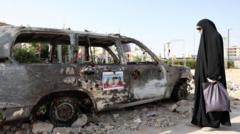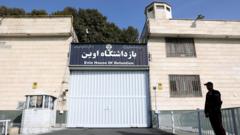President Trump's recent speculation about regime change in Iran has stirred controversy following US strikes on Iranian nuclear facilities. While some officials deny these actions aim to topple Iran's government, the geopolitical implications could lead to significant conflict escalation in the region.
Trump Raises Regime Change Speculation Amid US-Iran Tensions

Trump Raises Regime Change Speculation Amid US-Iran Tensions
Amid escalating military actions between the US and Iran, Trump suggests a potential regime change in Iran, diverging from official statements by his administration.
Former President Donald Trump has ignited discussions regarding a potential regime change in Iran following coordinated military actions by the United States and Israel targeting Iranian nuclear installations. In a social media post on Sunday, Trump rhetorically questioned, "why wouldn't there be a Regime change???", a statement that has juxtaposed him against high-ranking officials within his own administration who clarified that the objective of the strikes was not to alter Iran's leadership.
The US-led airstrikes, which targeted three specific sites believed to be part of Iran's nuclear infrastructure, came after a series of heightened tensions characterized by military hostilities between Iran and Israel. These events sparked fears from both Trump and Israeli Prime Minister Benjamin Netanyahu that Iran might be advancing toward the capability of developing nuclear weapons, a claim Iran continues to deny.
In light of the attacks from Saturday, Trump touted the operation as inflicting "monumental damage" on Iran, although independent assessments regarding the extent of this destruction remain inconclusive. The United Nations' nuclear oversight body has called for a ceasefire to facilitate inspections of the targeted sites, highlighting the need for clarity in the situation.
The backlash from Iran was swift and severe, with threats of "everlasting consequences" being articulated in response to the US air raids. Furthermore, the Iranian parliament approved plans to potentially shut down the Strait of Hormuz, a critical transit route for a significant portion of the global oil and gas supply.
On Monday, Israeli military sources reported incoming missiles from Iran, contributing to a spiraling cycle of retaliation and heightened military readiness among US forces stationed in the Middle East. This situation prompted the State Department to issue a global warning for Americans traveling abroad, advising increased caution.
While Trump had previously criticized prolonged military engagements abroad during his campaign, his recent advocacy for military action against Iran could implicate the US deeper into regional conflicts. Concerns were raised by both Republicans and Democrats within the US Congress, asserting that Trump's actions may unintentionally escalate tensions and mirror previous military interventions that led to protracted combat in the region.
As geopolitical realities unfold, the repercussions of these developments may alter the landscape of US-Iran relations significantly, drawing international attention and potential intervention from global players like China and Russia.




















